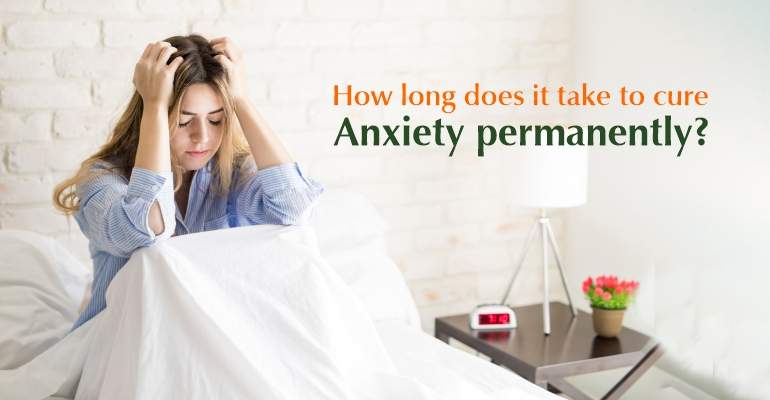How Long Does it Take to Cure Anxiety Permanently?

How Long Does it Take to Cure Anxiety Permanently?
Anxiety can be a debilitating condition, impacting every aspect of one’s life. It’s natural to seek relief, but the journey to finding a permanent cure can be complex and individualized. In this blog post, we’ll explore the factors influencing the duration of anxiety treatment, potential paths to recovery, and some frequently asked questions surrounding anxiety management.
Contents
Understanding Anxiety:
Before delving into the question of duration, it’s crucial to understand anxiety itself. Anxiety disorders are complex mental health conditions characterized by excessive worry, fear, and nervousness. They can manifest in various forms, including generalized anxiety disorder (GAD), social anxiety disorder, panic disorder, and more. Each individual’s experience with anxiety is unique, influenced by genetics, environment, past experiences, and other factors.
Factors Influencing Treatment Duration:
Severity of Anxiety: The severity of one’s anxiety symptoms plays a significant role in determining the duration of treatment. Mild cases may respond well to self-help strategies or short-term therapy, while severe cases may require long-term therapy and medication.
Treatment Approach: Treatment for anxiety can involve a combination of psychotherapy, medication, lifestyle changes, and alternative therapies. The chosen approach, along with its effectiveness for the individual, will impact the duration of treatment.
Individual Response: People respond differently to treatment. Some may experience relief relatively quickly, while others may require more time to see significant improvements. Factors such as personal resilience, support systems, and adherence to treatment recommendations influence individual response.
Underlying Factors: Addressing underlying issues contributing to anxiety, such as trauma, substance abuse, or medical conditions, may extend the treatment duration. Comprehensive treatment often involves addressing these factors alongside anxiety symptoms.
Paths to Recovery:
Therapy: Cognitive-behavioral therapy (CBT), exposure therapy, and other forms of psychotherapy are commonly used to treat anxiety. Therapy helps individuals understand their anxiety, develop coping strategies, and challenge irrational thoughts and behaviors.
Medication: Antidepressants, benzodiazepines, and other medications may be prescribed to alleviate anxiety symptoms. Medication can provide short-term relief while individuals work on underlying issues in therapy.
Lifestyle Changes: Healthy lifestyle habits, including regular exercise, balanced diet, sufficient sleep, and stress management techniques, can complement formal treatment and support overall well-being.
Support Networks: Building a strong support network consisting of friends, family, support groups, or online communities can provide valuable emotional support and encouragement throughout the treatment process.
Conclusion:
The journey to overcoming anxiety is not linear, nor is there a one-size-fits-all timeline for recovery. It’s essential to approach treatment with patience, persistence, and an open mind. While some individuals may find relief relatively quickly, others may require ongoing support and management strategies. By addressing the underlying causes, utilizing effective treatments, and cultivating a supportive environment, it is possible to manage anxiety and improve overall quality of life.
Remember, seeking professional help from a healthcare provider or mental health professional is crucial for accurately diagnosing and treating anxiety disorders. If you or someone you know is struggling with anxiety, don’t hesitate to reach out for support and guidance.
FAQ's
Zopiclone is primarily used to treat insomnia, not anxiety. It belongs to a class of medications called sedative-hypnotics, which help induce sleep. While it may temporarily alleviate symptoms of anxiety related to sleep disturbances, it is not considered a first-line treatment for anxiety disorders.
The duration of therapy for anxiety varies depending on factors such as the individual’s needs, treatment goals, and progress. Some may benefit from short-term therapy lasting a few months, while others may engage in longer-term therapy for a year or more.
Several natural remedies and lifestyle changes may help alleviate symptoms of anxiety, including regular exercise, mindfulness meditation, relaxation techniques, herbal supplements and maintaining a healthy lifestyle. However, it’s essential to consult with a healthcare professional before trying any new treatment approach.
While anxiety disorders can be chronic and recurrent, they are treatable conditions. With appropriate treatment and management strategies, many individuals experience significant improvement in their symptoms and quality of life. However, it’s essential to continue practicing self-care and seeking support as needed.






